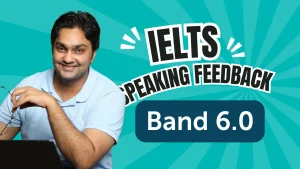IELTS Speaking
All parts of the IELTS Speaking are important, however the second part carries a LOT of weight. That’s because you are giving a 1-2 minute speech about a topic you will be getting in the IELTS Speaking Part 2. But rest assured, you will be graded based on 4 marking criteria for all of your parts.
Many of my students ask me, “Sir Yasir, which part of the IELTS Speaking test is important?”, and I always instruct them to focus on all 3 parts as each one grades you based on your ability to answer effectively.
Let’s understand the importance of each part:
Speaking Part 1
The first part will be an ice-breaking session. The examiner would make you comfortable, ask about you and get to know about your location, food, lifestyle, profession/studies, etc. It is important not to get confused in the first part because you actually have 2 more parts to speak on. Hence, if you remain calm and steadfast during part 1, I assure you, it will go as good as you want it to be for the second and the third part.
Most of the questions will be easy to answer, such as:
Do you work or study?
What do you like to eat?
What do you think about stars and galaxies?
Do you live in an apartment or a home?
Questions like these do not really require much analytical thought-process as they are simple and straightforward. But please, a simple “Yes”, or “No”, does not count as an answer. Please provide a justification and elaboration of a few seconds for your answer to provide some context. Imagine you’re asking questions from someone, and all they do is response back with a “Yes”, or “No.” Doesn’t seem right? Yes, that’s why you also need to go beyond than just one-word answers.
The way you answer questions in Part 1, sets your tone for the Cue Card in Part 2.
Speaking Part 2
Alright. Time for you to open up, be confident, and talk about a topic for 1 to 2 minutes. We call this the Cue Card section, where the examiner will show you a cue card, and provide you with 1 minute to prepare for an answer. Once 1 minute is over, you will have 1 to 2 minutes to speak on the topic without any interruptions. You will be judged based upon your pronunciation, confidence and grammar.
Be sure to speak at least for 1 minute, because anything less will lead to penalty. To ensure you speak for over a minute, while practicing for the test, always time yourself and practice accordingly.
To allow the examiner in understanding a broader range of your English language, grammar and vocabulary, it is imperative you speak with confidence and expand upon the bullet points you see. If not, you can simply make up a story of your own so that you have enough ideas to speak on without much interruptions.
Give examples of the past, show emotions, and have a strong and positive body language through your hand movements as you speak. This will show the examiner how confident and expressive you are in real life. By the end of Speaking Part 2,
Speaking Part 3
Part 3 is all about cross-questioning. The examiner will ask more in-depth questions about the responses you gave in Part 2. The questions will be more analytical in nature, and demand a thought-process. In this part, be confident and have expressions on your face as you answer. This way, you can boost your overall IELTS Speaking score.
Recommended for IELTS Speaking:
- IELTS Speaking Test
- Common topics and preparation for IELTS Speaking Part 1
- IELTS Speaking Part 2 Cue Card
- Speaking Part 3 Topics and Preparation
FAQs:
Which part of the IELTS Speaking test is the most important?
All parts of the IELTS Speaking test are important and contribute to your final score. However, Part 2, the Cue Card section, carries significant weight because it requires you to give a 1-2 minute speech on a given topic. Your performance in Part 2 demonstrates your ability to speak at length, organize your thoughts, and use a wide range of vocabulary and grammar. Nevertheless, focusing on all three parts is crucial, as each evaluates different aspects of your speaking skills.
What should I expect in IELTS Speaking Part 1?
In IELTS Speaking Part 1, you can expect an ice-breaking session where the examiner will ask about your background, such as your location, food preferences, lifestyle, and profession or studies. These questions are straightforward and designed to make you feel comfortable. It’s essential to provide more than one-word answers and to elaborate briefly to show your ability to communicate effectively.
How can I prepare for IELTS Speaking Part 2?
To prepare for IELTS Speaking Part 2, practice speaking on various topics for 1-2 minutes without interruption. Use a timer to ensure you speak for at least one minute. Focus on expanding your answers by giving examples, showing emotions, and using positive body language. Familiarize yourself with common cue card topics and practice organizing your thoughts quickly during the one-minute preparation time.
What types of questions are asked in IELTS Speaking Part 3?
In IELTS Speaking Part 3, the examiner will ask more in-depth and analytical questions related to your responses in Part 2. These questions require you to think critically and provide detailed answers. This part tests your ability to engage in a more complex conversation, analyze issues, and discuss ideas in depth. Being confident and expressive in your answers can help improve your overall score.
Will my IELTS Speaking score be affected if I struggle with a question?
Your IELTS Speaking score may be slightly impacted if you struggle with a question or two, but it will not be significantly affected as long as you answer most questions effectively. If you fail to respond to many questions or do not speak for at least one minute in Part 2, your score will be negatively impacted. However, occasional difficulties are normal, and overall performance is what matters most.
When will I get my score?
The examiner would have already calculated your band score by the end of the test.
What if I didn’t answer one part? Will it impact my score?
If you were unable to answer many questions from Part 1 or 3, or could not speak for at least 1 minute in Part 2, then yes, you will lose marks. However, while you are answering all questions, and if you struggle with a question or two, then it should not have a big impact on your score.
I hope these were some good tips to help you in preparing for your Speaking exam. Let us know in the comments how did your speaking test go 🙂 Or feel free to ask any questions if you have any.





